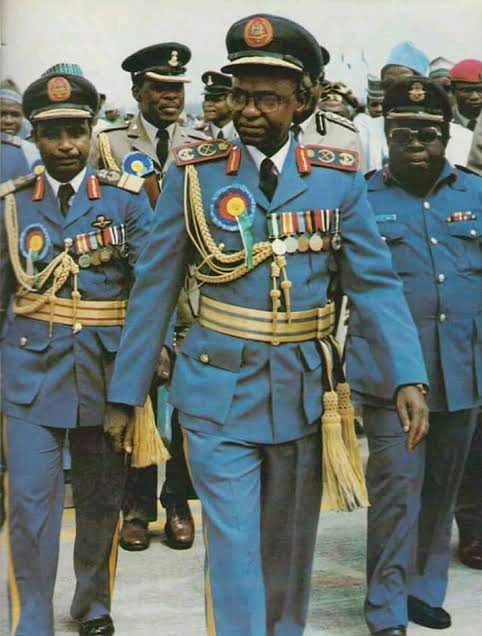Military Coup in Nigeria – 31 December 1983
A military coup took place in Nigeria on 31 December 1983. It was coordinated by key officers of the Nigerian military and led to the ousting of the democratically elected government of President Shehu Shagari. The coup resulted in the installation of Major General Muhammadu Buhari as head of state.
Background
Tensions between the civilian and military sectors of Nigerian governance were escalating. One notable incident involved General Muhammadu Buhari, then commanding officer of the 3rd Division, who cut off fuel and food supplies into neighboring Chad due to border disputes.
President Shehu Shagari opposed this action, but Buhari defied direct orders and pursued Chadian forces about 50 kilometers into Chad. This created a deep rift between the presidency and the military.
Shortly before the coup, the director general of the National Security Organization (NSO), Umaru Shinkafi, intercepted vague intelligence suggesting the existence of coup plots. However, due to the unclear nature of the information, the NSO could not act on it effectively.
Coup Details
Colonel Tunde Ogbeha was tasked with negotiating the peaceful surrender of the Brigade of Guards, President Shagari’s protective unit. Ogbeha was unable to reach Colonel Bello Kaliel, the commander of the brigade, and his movements aroused suspicion.
Brigadier Ibrahim Bako was assigned to arrest President Shagari, believing surrender terms had been agreed. However, no such negotiation had taken place. Plot details had leaked to the presidency and officers within the Brigade of Guards, including Captain Anyogo and Lt Colonel Eboma.
As expected, Bako arrived at the presidential villa, but the guards had not been pacified. A firefight broke out, and Brigadier Bako was killed during the attempt.
Participants
- Major General Muhammadu Buhari – GOC, 3rd Armored Division, Jos
- Moshood Kashimawo Abiola – Business tycoon (alleged financier)
- Major General Ibrahim Babangida – Director of Army Staff Duties and Plans
- Brigadier Ibrahim Bako – Brigade Commander
- Brigadier Sani Abacha – Commander, 9th Mechanized Brigade
- Brigadier Tunde Idiagbon – Military Secretary, Army
- Lt Colonel Aliyu Mohammed Gusau – Director of Military Intelligence
- Lt Colonel Halilu Akilu
- Lt Colonel David Mark
- Lt Colonel Tunde Ogbeha
- Major Sambo Dasuki – Military Assistant to the Chief of Army Staff
- Major Abdulmumini Aminu
- Major Lawan Gwadabe
- Major Mustapha Jokolo – Senior Instructor, Basawa Barracks, Zaria
- Major Abubakar Umar
Additional Notes on Buhari’s Role
Though General Buhari denied involvement in the coup, historians Max Siollun and Nowa Omoigui have cited events that suggest otherwise.
Major Daniel Bamidele, after hearing about the coup, reported it to his commanding officer, Buhari. Instead of being commended, Bamidele was detained for two weeks to prevent the information from leaking. He was released only after the coup had been successfully carried out.
This experience discouraged him from reporting rumors of the later Vatsa coup, which led to his execution. At his trial, he said:
"I heard of the 1983 coup planning, told my GOC General Buhari who detained me for two weeks in Lagos. Instead of a pat on the back, I received a stab. How then do you expect me to report this one? This trial marks the eclipse of my brilliant and unblemished career of 19 years. I fought in the civil war with the ability it pleased God to give me. It is unfortunate that I'm being convicted for something which I have had to stop on two occasions. This is not self-adulation but a sincere summary of the qualities inherent in me. It is an irony of fate that the president of the tribunal who in 1964 felt that I was good enough to take training in the UK is now saddled with the duty of showing me the exit from the force and the world."
Additionally, in a 2015 interview, Sambo Dasuki stated that he and two other officers travelled to Jos to brief Buhari—then GOC of the 3rd Armoured Division—on the progress of the coup.
Following the takeover, Buhari's Supreme Military Council observed a minute of silence for Brigadier Bako during its first meeting.
See Also
- Military coups in Nigeria
References
Historical accounts by Max Siollun and Nowa Omoigui; military tribunal statements; interview transcripts (2015).
